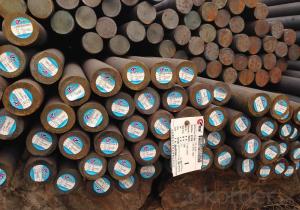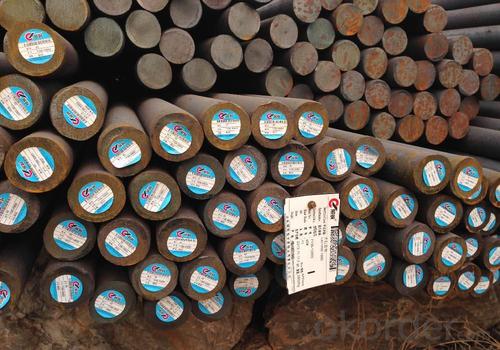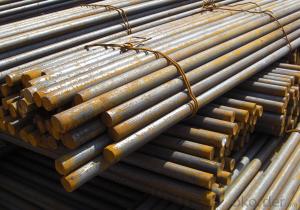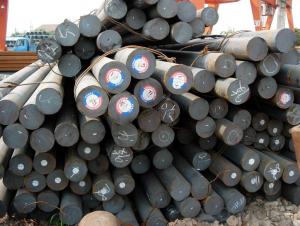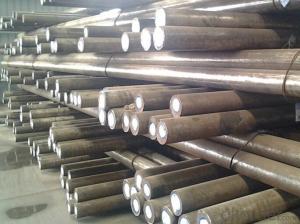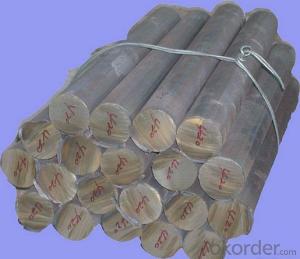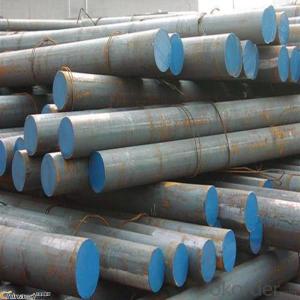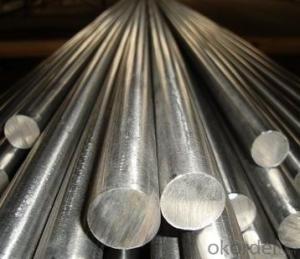Special Steel DIN 25CrMo4 Hot Rolled Steel Round Bars
- Loading Port:
- China main port
- Payment Terms:
- TT OR LC
- Min Order Qty:
- 30 m.t.
- Supply Capability:
- 10000 m.t./month
OKorder Service Pledge
OKorder Financial Service
You Might Also Like
Specification
Product Information
1 Standards and Chemical Composition:
GB | DIN | JIS | BS |
20CrMo | 25CrMo4 | SCM420 | 25CrMo4 |
C | Si | Mn | P | S | Cr | Ni | Cu |
0.17-0.23 | 0.15-0.35 | 0.55-0.90 | 0.030 | 0.030 | 0.85-1.25 | 0.30 | 0.30 |
2 Mechanical Property:
Yield Strength (MPa) | ≥685 |
Tensile Strength (MPa) | ≥885 |
Elongation (%) | ≥12 |
Hardness (HB) | ≤197 |
Reduction in Area (%) | ≥50 |
AKV (J) | ≥78 |
3 Brief Introduction:
Dimension | 14-350mm |
Length | 2-13m or as per your request |
Delivery condition | Hot rolled |
Heat Treatment | Normalizing, Annealing, Quenching |
Packing | Standard seaworthy packing or according to your requirements |
Product Show
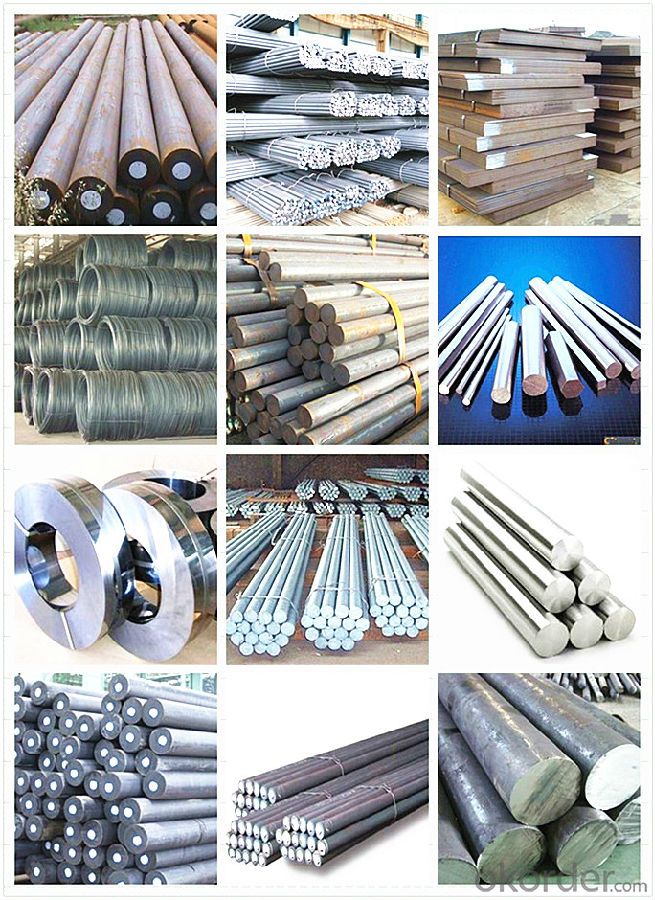
Workshop Show
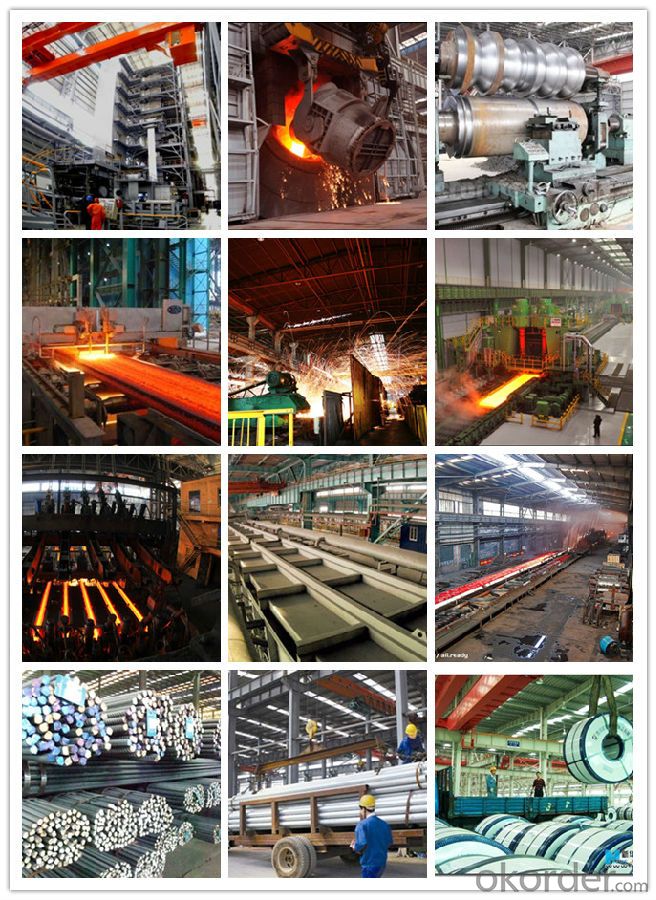
Shipping
1. FedEx/DHL/UPS/TNT for samples, Door-to-Door;
2. By Air or by Sea for batch goods, for FCL; Airport/ Port receiving;
3. Customers specifying freight forwarders or negotiable shipping methods!
Delivery Time: 3-7 days for samples; 5-25 days for batch goods.
Payment Terms
1.Payment: T/T, L/C, Western Union, MoneyGram,PayPal; 30% deposits; 70% balance before delivery.
2.MOQ: 1pcs
3.Warranty : 3 years
4.Package Informations: 1) EXPORT, In 20 feet (GW 25 ton) or 40 feet Container (GW 25 ton)
2)as customer's requirement
Why choose us?
(1) The leading exporter in China special steel industry.
(2) Large stocks for various sizes, fast delivery date.
(3) Good business relationship with China famous factories.
(4) More than 7 years steel exporting experience.
(5) Good after-sales service guarantee.
- Q: How is case-hardening steel used in the production of gears and camshafts?
- Case-hardening steel is used in the production of gears and camshafts to enhance their surface hardness and durability. The process involves heating the steel to a specific temperature and then rapidly cooling it, creating a hard outer layer while maintaining a tough and ductile core. This hardened surface allows gears and camshafts to withstand the high levels of stress, friction, and wear they experience during operation, resulting in improved performance, longevity, and reliability.
- Q: How does special steel perform in high-stress environments?
- Special steel is specifically designed to perform exceptionally well in high-stress environments. Its unique composition and manufacturing process make it highly resistant to various forms of stress, such as mechanical, thermal, and chemical stress. One of the key properties of special steel is its high tensile strength, which allows it to withstand immense pressure without deformation or failure. This strength is achieved through the addition of alloying elements, such as chromium, nickel, and molybdenum, which enhance its structural integrity and toughness. The presence of these elements also increases the steel's resistance to corrosion and oxidation, making it more durable and reliable in harsh environments. Moreover, special steel exhibits excellent fatigue resistance, enabling it to withstand repetitive and cyclic loading without developing cracks or fractures. This property is crucial in high-stress environments where components are subjected to constant vibrations or cyclic loading, such as in aerospace, automotive, and industrial applications. In addition to its mechanical properties, special steel is also highly resistant to extreme temperatures. It can maintain its strength and integrity even at elevated temperatures, making it suitable for applications in high-temperature environments such as power plants, furnaces, and chemical processing industries. Furthermore, special steel has excellent wear resistance, which enables it to withstand abrasive conditions, such as those encountered in mining, construction, or manufacturing processes. This reduces the need for frequent maintenance or replacement, resulting in cost savings and increased productivity. Overall, special steel's exceptional performance in high-stress environments can be attributed to its unique combination of strength, durability, corrosion resistance, fatigue resistance, temperature resistance, and wear resistance. Its ability to withstand extreme conditions makes it an ideal choice for critical applications where reliability and safety are paramount.
- Q: How does special steel contribute to the toughness of products?
- There are several ways in which special steel enhances the toughness of products. Firstly, its high strength and durability are well-known. Specific alloying elements and heat treatment processes are used in its manufacturing, which improve its mechanical properties and make it more resistant to wear and tear. As a result, products made from special steel can withstand heavy loads, impacts, and harsh environments, making them tougher and less prone to breakage. Moreover, special steel possesses excellent corrosion resistance properties. This is achieved by adding specific alloying elements like chromium and nickel, which create a protective layer on the steel's surface, preventing rust and corrosion. The ability to resist corrosion adds to the toughness of the products since they can be used in corrosive environments without experiencing degradation or loss of performance. Furthermore, special steel offers enhanced heat resistance. It can endure high temperatures without compromising its structural integrity or mechanical properties. This is particularly valuable in industries such as aerospace, automotive, and energy, where components are subjected to extreme temperatures. The capacity of special steel to maintain toughness under high heat conditions contributes to the overall reliability and longevity of the products. Additionally, special steel can be customized to meet specific requirements. Manufacturers can tailor the composition and properties of the steel according to the intended application. For instance, various types of special steel alloys are utilized in the production of cutting tools, bearings, and structural components. By selecting the appropriate grade of special steel, manufacturers can optimize the toughness of their products, ensuring they can withstand the intended use and perform reliably. In conclusion, special steel enhances the toughness of products through its high strength, corrosion resistance, heat resistance, and customizability. The distinctive properties of special steel make it an ideal choice for a wide range of applications where toughness and durability are essential factors.
- Q: What are the main factors affecting the heat resistance of special steel?
- The main factors affecting the heat resistance of special steel include its alloy composition, microstructure, and heat treatment. Alloy composition plays a crucial role in determining the heat resistance of special steel. The addition of specific elements such as chromium, nickel, molybdenum, and tungsten can enhance the steel's ability to withstand high temperatures. These alloying elements form stable oxide layers on the surface of the steel, which act as a barrier against oxidation and corrosion at elevated temperatures. The microstructure of special steel also influences its heat resistance. The steel's grain size, distribution of phases, and the presence of precipitates can affect its thermal stability. Fine-grained structures and a homogeneous distribution of phases help improve the steel's resistance to creep, which is the deformation that occurs under prolonged exposure to high temperatures. Additionally, the presence of precipitates, such as carbides or intermetallic compounds, can provide strengthening mechanisms that enhance the steel's resistance to thermal softening. Heat treatment processes, such as quenching and tempering, can significantly impact the heat resistance of special steel. Proper heat treatment can optimize the microstructure and enhance the steel's mechanical properties, including its resistance to thermal degradation. For instance, a well-controlled quenching process can promote the formation of a martensitic structure, which increases the steel's hardness and strength at high temperatures. Other factors that can affect the heat resistance of special steel include the presence of impurities, surface conditions, and environmental factors. Impurities, such as sulfur and phosphorus, can reduce the steel's resistance to high temperatures by promoting the formation of brittle phases or facilitating oxidation. Surface conditions, such as roughness or the presence of cracks, can lead to localized heating and accelerated degradation. Environmental factors, such as the presence of corrosive gases or high humidity, can also influence the steel's heat resistance by promoting oxidation or corrosion processes. In summary, the heat resistance of special steel is influenced by its alloy composition, microstructure, heat treatment, impurities, surface conditions, and environmental factors. Understanding and optimizing these factors are crucial for developing special steel with superior heat resistance for various industrial applications.
- Q: What are the different methods for improving the toughness of special steel?
- There are several methods for improving the toughness of special steel. One method is through heat treatment, which involves processes such as quenching and tempering to enhance the steel's microstructure and increase its toughness. Another method is alloying, where specific elements are added to the steel composition to improve its toughness properties. Additionally, techniques like grain refinement and controlled rolling can also be employed to enhance the toughness of special steel.
- Q: What are the main advantages of using special steel in the food processing industry?
- The main advantages of using special steel in the food processing industry are its high resistance to corrosion, durability, and hygiene. Special steel is specifically designed to withstand harsh environments, such as exposure to acidic or alkaline substances, which are common in food processing. It does not rust or react with food, ensuring the quality and safety of the final product. Additionally, special steel is easy to clean and maintain, making it an ideal choice for food processing equipment.
- Q: Can special steel be used for making aerospace components?
- Indeed, aerospace components can be manufactured using special steel. Also referred to as aerospace steel or aircraft steel, this specific type of steel is meticulously designed to meet the rigorous demands and strict requirements of the aerospace sector. It possesses outstanding properties such as exceptional strength, durability, and heat resistance, all of which are vital for enduring the extreme conditions faced by aircraft components during flight. Aerospace components, including landing gear, engine parts, fasteners, and structural elements, often necessitate materials that can maintain their integrity even when subjected to high temperatures, stress, and corrosive environments. Special steel alloys are developed to possess excellent mechanical properties, such as high tensile strength, fracture toughness, and resistance to fatigue, creep, and corrosion. These properties render them suitable for crucial aerospace applications where safety and reliability are of the utmost importance. Furthermore, special steel can be customized to meet specific requirements, such as weight reduction, improved fuel efficiency, and enhanced performance. By employing advanced alloying techniques and heat treatments, aerospace steel can be engineered to possess desirable characteristics like increased hardness, wear resistance, and dimensional stability. This enables the production of lighter and more efficient aerospace components without compromising on strength or safety. In conclusion, special steel stands out as the preferred material for manufacturing aerospace components due to its exceptional mechanical properties, heat resistance, and corrosion resistance. Its ability to withstand extreme conditions and be tailored to specific requirements makes it an ideal choice for producing critical parts used in the aerospace industry.
- Q: What are the common challenges in heat treatment of special steel?
- To achieve the desired material properties, careful attention must be given to several challenges encountered in the heat treatment of special steel. One primary challenge revolves around the necessity for meticulous temperature control throughout the heating and cooling stages. Special steels typically have specific temperature ranges for heat treatment that must be strictly adhered to in order to attain the desired microstructure and mechanical properties. Failing to maintain precise temperature control can result in inadequate or inconsistent heat treatment, ultimately leading to suboptimal material performance. Another challenge lies in the potential distortion or warping of the steel components during the heat treatment process. Special steels often possess intricate designs or complex shapes, making them more susceptible to distortion when subjected to high temperatures. This distortion can have adverse effects on the overall quality and dimensional accuracy of the final product. Consequently, careful consideration must be given to the selection of suitable heating and cooling methods, as well as the utilization of fixtures or jigs to minimize distortion. Moreover, special steels may contain alloying elements that significantly influence the heat treatment process. Elements like chromium, molybdenum, or vanadium can alter the steel's hardenability, tempering response, or transformation behavior. Their presence can introduce additional challenges when determining the optimal heat treatment parameters, necessitating adjustments to heating and cooling rates, soak times, or quenching media. Lastly, achieving uniformity in heat treatment across a batch of special steel components can prove to be challenging. Variations in size, shape, or composition within a batch can result in inconsistent heat treatment outcomes. Controlling the heating and cooling rates, ensuring proper circulation of the heat treatment media, and implementing effective process monitoring techniques are essential in achieving consistent and uniform material properties. In conclusion, the heat treatment of special steel encompasses challenges such as precise temperature control, distortion/warping, the influence of alloying elements, and achieving uniformity across a batch. Successfully addressing these challenges requires a comprehensive understanding of the steel's composition, meticulous process planning, and the utilization of appropriate process controls and monitoring techniques.
- Q: How does special steel perform in high-temperature creep resistance?
- Special steel has excellent performance in high-temperature creep resistance. It is specifically designed to withstand prolonged exposure to elevated temperatures without undergoing excessive deformation. This is achieved through the addition of alloying elements and a careful heat treatment process, which help to enhance the steel's strength, stability, and resistance to creep. Special steel's superior creep resistance makes it a reliable choice for applications that involve high temperatures and long-term stress, ensuring the structural integrity and durability of the material.
- Q: Is special steel suitable for manufacturing firearms?
- Indeed, manufacturing firearms necessitates the use of special steel, which boasts remarkable attributes including high strength, hardness, and resistance to wear and corrosion. These properties are crucial as firearms must endure extreme pressures, recoil forces, and intense heat generated during firing. Various special steel alloys, such as stainless steel or chrome-molybdenum steel, offer exceptional tensile strength, enabling firearms to withstand the immense pressure resulting from the combustion of gunpowder. Additionally, the hardness of special steel guarantees the durability of critical components like barrels and receivers, ensuring they remain intact and free from deformations or fractures even with frequent use. Moreover, firearms require resistance to wear and corrosion as they frequently encounter harsh environmental conditions and diverse weather patterns. Special steel alloys are meticulously engineered to possess superior resistance to both wear and corrosion, assuring that firearms remain operational and reliable even after prolonged exposure to moisture or extended usage. Furthermore, special steel alloys can be effortlessly machined and shaped into intricate forms, empowering manufacturers to produce firearm components with meticulous precision. This versatility in manufacturing processes facilitates the creation of firearms that meet stringent quality standards and precise specifications. To conclude, special steel is undeniably the ideal choice for manufacturing firearms due to its exceptional strength, hardness, resistance to wear and corrosion, as well as its ease of machining. These properties secure the reliability, durability, and performance of firearms, making special steel the optimal material for this purpose.
Send your message to us
Special Steel DIN 25CrMo4 Hot Rolled Steel Round Bars
- Loading Port:
- China main port
- Payment Terms:
- TT OR LC
- Min Order Qty:
- 30 m.t.
- Supply Capability:
- 10000 m.t./month
OKorder Service Pledge
OKorder Financial Service
Similar products
Hot products
Hot Searches
Related keywords
